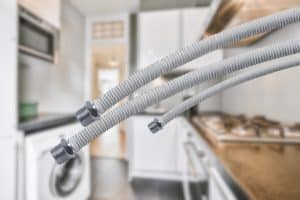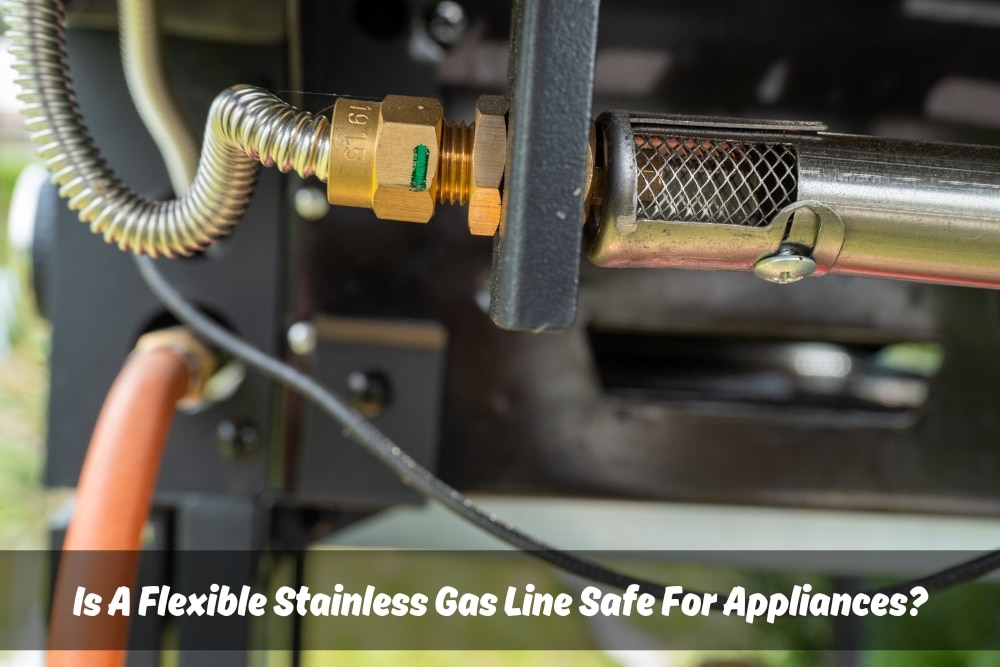When it comes to connecting your gas appliances, safety is paramount. But with so many options available, you might be wondering if a flexible stainless steel gas line is the right choice for your home. This guide will delve into the world of flexible gas lines, exploring their benefits, safety features, and considerations for use.
What is a flexible stainless gas line?
A flexible stainless steel gas line, also known as CSST (Corrugated Stainless Steel Tubing), is a modern alternative to traditional rigid piping. They are constructed with a corrugated stainless steel inner liner encased in a protective yellow jacket. This design provides a high degree of flexibility, making them ideal for navigating tight spaces during appliance installation.
These lines are commonly used to connect gas stoves, ovens, heaters, BBQs, and other gas-powered appliances to the main gas supply line.
Why choose a flexible stainless gas line for your appliances?
There are several compelling reasons to consider flexible stainless steel gas lines for your appliances:
- Flexibility and ease of installation: Unlike rigid pipes that require precise measurements and bends, flexible lines can easily navigate around obstacles and uneven surfaces. This simplifies installation, especially in tight spaces behind appliances or in areas with existing plumbing.
- Resistance to corrosion and durability: Stainless steel is naturally resistant to rust and corrosion, making it a long-lasting choice. This is particularly important in areas prone to moisture or humidity.
How do flexible stainless gas lines ensure safety?
Safety is a top priority when dealing with gas lines. Here’s how flexible stainless steel lines ensure your home’s safety:
- Safety features and regulations: CSST lines are manufactured and tested to meet strict safety standards set by regulatory bodies. They come equipped with a yellow outer jacket that serves as a visual indicator of any potential damage. Additionally, the inner liner is often coated with a special material that helps detect leaks. In some cases, a thread sealant used for gas fittings might also be applied during installation to further enhance the connection’s tightness and leak prevention.

- Testing and certification standards: Before hitting the market, these lines undergo rigorous testing to ensure they can withstand high pressures and resist damage from external factors. Look for lines that are certified by reputable organisations like the Australian Gas Association (AGA).
Are flexible stainless gas lines compatible with various appliances?
The good news is that flexible stainless steel gas lines are compatible with most common gas appliances. However, there are a few things to consider:
- Compatibility with different types of appliances: Always check the manufacturer’s instructions for your specific appliance. Some appliances may require a specific length or type of gas line connection.
- Considerations for installation with specific appliances: For cooktops and ovens, ensure the line is long enough to reach the connection point comfortably without excess slack. For heaters and BBQs, ensure the line is rated for outdoor use and protected from the elements.
- Adherence to manufacturer recommendations: Following the manufacturer’s recommendations for gas line selection and installation is crucial for optimal safety and appliance performance.
Choosing the right gas line goes hand in hand with selecting suitable appliances. For gas water heaters, factors such as efficiency and connection types are essential. It’s also a smart move to compare different hot water systems before purchasing to ensure compatibility and avoid installation issues.
What risks should you be aware of in gas line usage?
While generally safe, gas lines do come with inherent risks if not handled properly:
- Potential hazards and safety concerns: Gas leaks can pose a serious fire hazard. Additionally, improper installation or damage to the line can lead to gas leaks and carbon monoxide poisoning.
- Mitigation strategies for minimising risks: Regularly inspect your gas lines for signs of wear and tear, such as kinks, cuts, or loose connections. It’s also crucial to have proper ventilation in areas where gas appliances are used.
- Maintenance practices for ensuring safety: Avoid placing heavy objects on the line or exposing them to extreme temperatures. A licensed gas fitter can perform a professional inspection for peace of mind.
When is it time to consider replacing or upgrading your gas line?
Several factors can indicate the need to replace your gas line:
- Signs of wear and tear: Visible signs of damage like cracks, rust, or leaks are a clear indication for replacement.
- Recommended replacement intervals: Most manufacturers recommend replacing flexible gas lines every 10-15 years, depending on usage and environmental conditions.
- Upgrading for improved safety and efficiency: If your current line is a non-certified older model, consider upgrading to a CSST line for enhanced safety and potentially improved gas flow.
How to properly install and maintain a flexible stainless gas line?
While a flexible stainless steel gas line offers a degree of ease in installation compared to rigid pipes, it’s crucial to weigh the risks and benefits before attempting a DIY project. Here’s a breakdown of the considerations:
- Professional Installation: Hiring a licensed gas fitter guarantees a safe and compliant installation. They possess the expertise to ensure the line is properly sized, routed, and secured according to regulations. This is particularly important for gas lines exposed to outdoor elements or concealed within walls.
- DIY Installation: If you’re a confident DIYer with a good understanding of gas fitting principles and local regulations, you might consider tackling the installation yourself. However, ensure you have the necessary tools, materials, and knowledge to complete the job safely and correctly. Remember, even minor errors in gas line installation can have serious consequences.
Always prioritise safety. If you’re unsure about your DIY skills or the complexity of the installation, opting for a professional is the best course of action.
So, are flexible stainless steel gas lines a good choice for connecting appliances?
Absolutely! Flexible stainless steel gas lines can be a safe and efficient choice for connecting your gas appliances. By understanding their benefits, safety features, and proper handling practices, you can ensure a secure and reliable gas supply for your home. Remember, to prioritise safety by following manufacturer recommendations, adhering to regulations, and seeking professional guidance when needed.
Upgrade safely with Apex Gas Heaters
Is your gas appliance due for a safety check, or are you worried about the safety of your existing gas lines? At Apex Gas Plumbing, we ensure your home runs smoothly and safely with our expert gas plumbing services. Our team of licenced gas fitters tackles all your gas needs, from installations and upgrades to repairs and routine maintenance.
We’ll thoroughly assess your situation, recommend the best approach, and handle any gas plumbing work with expertise and ensure it complies with all regulations. Experience the peace of mind that comes from knowing your gas system is in top condition. Get in touch with us today to discuss your project and get a quote.

